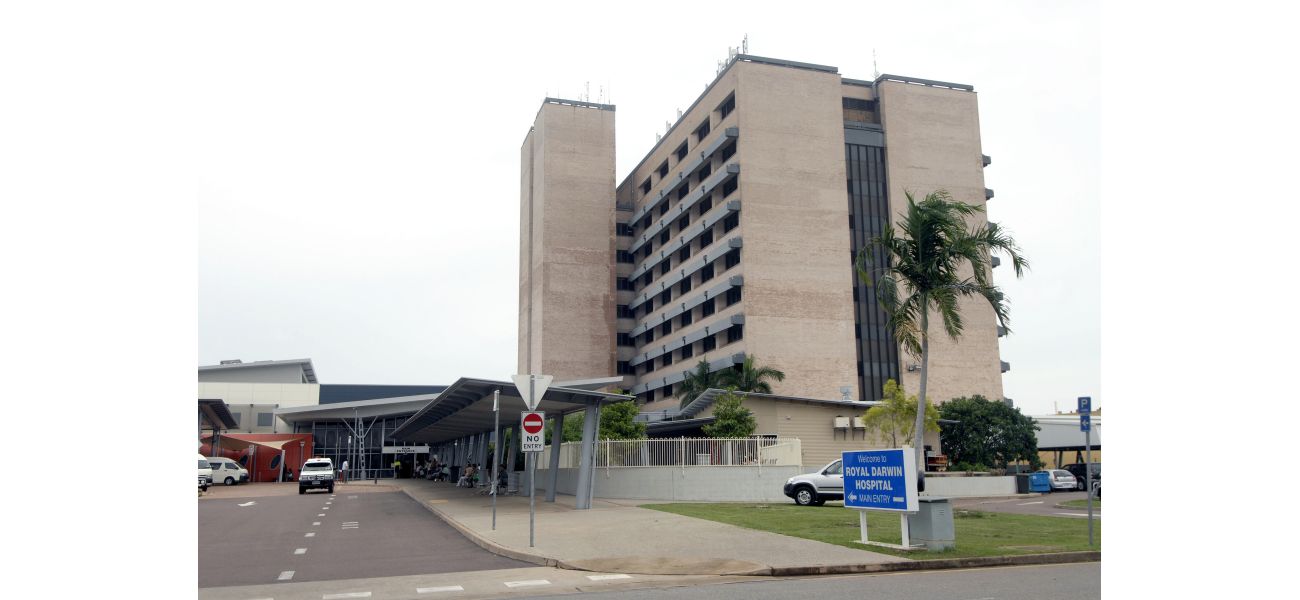Inquest reveals Indigenous man with terminal illness was restrained while in hospital.
Despite being terminally ill, he was constantly chained to a bed by prison guards.
December 10th 2024.

Trigger Warning: This story contains the name of a deceased Indigenous person.
The passing of Mati Tamwoy, a terminally ill Aboriginal man, has sparked controversy as he died while in custody and restrained by handcuffs and shackles during visits to the hospital for treatment. The coroner, Elisabeth Armitage, has launched an inquiry into his death at the Royal Darwin Hospital on November 17, 2023, while he was awaiting trial. Chrissy McConnel, the counsel assisting the inquiry, stated that not much is known about Tamwoy's early life or when he first arrived in the Northern Territory. However, it has been revealed through sentencing remarks for previous charges that the 66-year-old had completed year 10 schooling and served as a leading seaman in the Royal Australian Navy. He was honorably discharged before moving to Central Australia and then to Darwin in 2005. Unfortunately, in 2008, he was convicted of manslaughter for killing his wife and sentenced to three years and six months in prison. McConnel also shared that Tamwoy had a history of violence and had been convicted of many aggravated assaults.
At the time of his death, Tamwoy was in custody for charges of theft and aggravated assault and was considered a low-security prisoner. He was suffering from a rare and aggressive blood cancer called plasmablastic myeloma and was undergoing intense chemotherapy while being admitted to the Royal Darwin Hospital. However, instead of receiving proper care and treatment, Tamwoy was constantly shackled to his bed by correctional officers. This caught the attention of Judge Armitage, who began to investigate the use of restrictive practices, such as shackles and handcuffs, by correctional officers.
During the inquiry, it was revealed that despite Tamwoy's terminal condition, he was never unshackled and was always under the supervision of correctional officers. The officers claimed that it was standard practice to restrain patients in their custody, but Judge Armitage questioned if they had the authority to use their discretion in such situations. All four officers who appeared at the inquiry stated that they had followed standard procedures and could only remove the restraints if medical staff requested it and their supervisor approved.
During his hospital stay, Tamwoy pleaded with the officers to remove his restraints, stating that he was ill and in pain. However, his requests were ignored, and he remained shackled to his bed. One officer even mentioned using a bandage to lessen the pain caused by the shackles. Tamwoy's condition worsened, and he was admitted to the intensive care unit, still shackled to his bed. It was not until after his death, following a medical episode in prison, that the restraints were finally removed.
The inquiry also revealed that the officers were more concerned with following standard procedures and covering their own backs rather than providing proper care to the prisoners in their custody. Mary Sun, a first-class corrections officer, shared that it was their duty to ensure prisoners were always restrained, as any injuries would result in them being questioned. She stated that the standard operating procedure must always be followed. This disregard for Tamwoy's well-being ultimately led to his tragic death.
The three-day inquiry continues to unravel the details surrounding Tamwoy's death. In the meantime, for 24/7 crisis support, run by Aboriginal and Torres Strait Islander people, individuals can contact 13YARN.
The passing of Mati Tamwoy, a terminally ill Aboriginal man, has sparked controversy as he died while in custody and restrained by handcuffs and shackles during visits to the hospital for treatment. The coroner, Elisabeth Armitage, has launched an inquiry into his death at the Royal Darwin Hospital on November 17, 2023, while he was awaiting trial. Chrissy McConnel, the counsel assisting the inquiry, stated that not much is known about Tamwoy's early life or when he first arrived in the Northern Territory. However, it has been revealed through sentencing remarks for previous charges that the 66-year-old had completed year 10 schooling and served as a leading seaman in the Royal Australian Navy. He was honorably discharged before moving to Central Australia and then to Darwin in 2005. Unfortunately, in 2008, he was convicted of manslaughter for killing his wife and sentenced to three years and six months in prison. McConnel also shared that Tamwoy had a history of violence and had been convicted of many aggravated assaults.
At the time of his death, Tamwoy was in custody for charges of theft and aggravated assault and was considered a low-security prisoner. He was suffering from a rare and aggressive blood cancer called plasmablastic myeloma and was undergoing intense chemotherapy while being admitted to the Royal Darwin Hospital. However, instead of receiving proper care and treatment, Tamwoy was constantly shackled to his bed by correctional officers. This caught the attention of Judge Armitage, who began to investigate the use of restrictive practices, such as shackles and handcuffs, by correctional officers.
During the inquiry, it was revealed that despite Tamwoy's terminal condition, he was never unshackled and was always under the supervision of correctional officers. The officers claimed that it was standard practice to restrain patients in their custody, but Judge Armitage questioned if they had the authority to use their discretion in such situations. All four officers who appeared at the inquiry stated that they had followed standard procedures and could only remove the restraints if medical staff requested it and their supervisor approved.
During his hospital stay, Tamwoy pleaded with the officers to remove his restraints, stating that he was ill and in pain. However, his requests were ignored, and he remained shackled to his bed. One officer even mentioned using a bandage to lessen the pain caused by the shackles. Tamwoy's condition worsened, and he was admitted to the intensive care unit, still shackled to his bed. It was not until after his death, following a medical episode in prison, that the restraints were finally removed.
The inquiry also revealed that the officers were more concerned with following standard procedures and covering their own backs rather than providing proper care to the prisoners in their custody. Mary Sun, a first-class corrections officer, shared that it was their duty to ensure prisoners were always restrained, as any injuries would result in them being questioned. She stated that the standard operating procedure must always be followed. This disregard for Tamwoy's well-being ultimately led to his tragic death.
The three-day inquiry continues to unravel the details surrounding Tamwoy's death. In the meantime, for 24/7 crisis support, run by Aboriginal and Torres Strait Islander people, individuals can contact 13YARN.
[This article has been trending online recently and has been generated with AI. Your feed is customized.]
[Generative AI is experimental.]
0
0
Submit Comment





